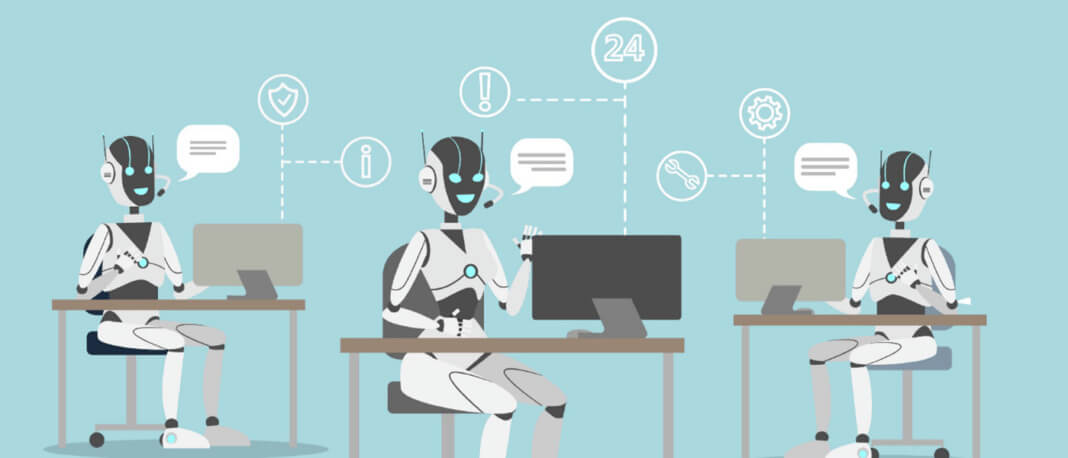Chatbots have been all the buzz in recent years, and you see them in abundance on Facebook Messenger. What might be the cause for this sudden surge in chatbots? Why are they getting so popular? How do they help your business?
The purpose of chatbots is to support and scale business teams in the area of customer relationship. For many companies, it has become necessary to solve the queries and problems of the customers to ensure consumer loyalty along with the brand establishment. Many times, customers expect to get answers and to get them fast. Therefore, chatbots are here 24/7 for the customers, revolutionizing the customer service industry.
By doing so, chatbots also help businesses save cost as well as increase sales, thus driving increased adoption of this technology. To some, chatbots are considered the future of customer service and management.
Here are 5 reasons why AI chatbot will shape marketing in 2020:
#1 Remove the constraints of human limitations – 24×7
Many people have experienced listening to a chain of boring music playing while keeping on hold by a customer care agent. Or simply wanting to call into a customer support hotline to realize that it is after the service hours.
You no longer need to wait for the next available customer care agent or the next working day to get your questions answered. Since chatbots are basically virtual robots they will never get tired and will continue to respond to your questions. They will continue to operate every single day throughout the year without the need to take a break.
This is one of the many reasons why chatbots have become so popular among online businesses. The fact that they are functional round the clock, irrespective of time zones, business hours and public holidays, make them a valuable asset to the business, improving your customer satisfaction and helps you rank highly in your industry.
#2 Great at customer support with less room for errors
As human beings, we are restricted to the number of things we can do concurrently. A study found out that humans can only focus on 3–4 things at the same time. If it goes beyond that number, we are bound to meet errors.
Chatbots, on the other hand, can simultaneously have conversations with thousands of people. Unlike a live chat agent, chatbot is more scalable, less resource hungry and remove the need to wait during a live chat. No matter what time of the day or how many people are contacting your business, every single one of them will be answered almost instantly.
#3 Automate routine tasks like email follow up
Every company has a set of routine tasks to be carried out when interacting with their customers. Most of these tasks are handled manually via phone calls or emails. If a customer’s questions cannot be answered while on the phone or via email, it can reduce customer satisfaction which can impact negatively on the business.
Digitizing the customer journey allows businesses to automate simple routine tasks and create happier customers in the process. Some advance chatbots can even make an instant phone call or schedule a meeting upon request.
#4 Drive up organizational efficiency and user engagement
Nowadays, most companies have an online presence. But being on the internet means the boundaries of day and night, availability and unavailability have changed, as well as customers’ expectations. A chatbot provides users an interactive experience.
Instead of hiring more people for mundane and repetitive tasks, installing a chatbot business solution with automation can help drive productivity and cost savings. Chatbots are a one-time investment which helps businesses reduce down on staff required for customer service. Acquire.io is one example of a fully featured customer service software, covering live chat, co-browsing, chatbot, voice and video call, and customer profile management.
Bots can also use visual content like images or videos to keep customers engaged. A character-driven experience for the customers helps in better engagement. Businesses with higher engagement can boost their sales up.
#5 Machine learning and data analytics

AI chatbots or machine learning chatbots have advanced AI algorithms and conversation intelligence to provide a better customer experience by understanding customer needs and sentiments. Through learning, it can answer ambiguous questions and these chatbots become smarter with time, learning from past questions and answers.
Data analytics for chatbots also provide great insights into who uses the AI chatbot, how are they using it, why are they using it, did they get what they want, are your business objectives met? These high-level questions cannot be easily answered or tracked by a customer care agent. However, this can be easily obtained if you dive into your chatbot analytics.
These data can help you analyze what is going on, that will enable you to set well-defined KPIs, to know your customers and their expectations better, and maybe find out new use cases and business opportunities. Over time, your metrics also makes it possible to make changes to the AI chatbot or your marketing strategy to better meet your company’s needs.
What’s Next?
In short, we are going to rely on AI for a substantial number of things and chatbot is one of them. With the increasing expectations of customers, businesses need to adopt new technologies to meet those expectations.
With a good chatbot, businesses can look forward in providing a better customer experience, while driving productivity. The dominance of conversation bots has begun, and businesses that learn to leverage these tools will soon be in prime position in their respective industry.





